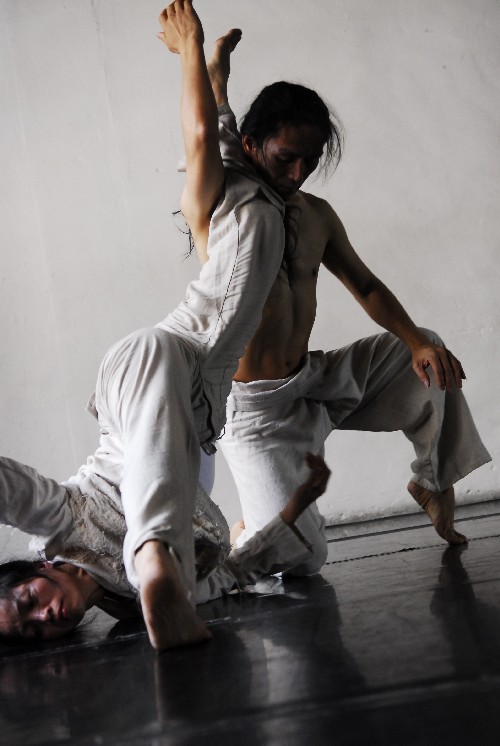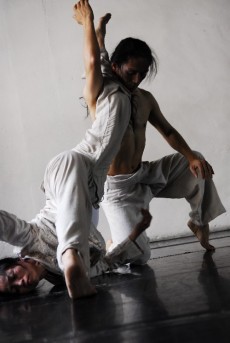CHINA unMADE: I dance em vários sistemas – especial Hong Kong | CHINA unMADE: I dance in many systems – Hong Kong especial
Sheila Ribeiro/dona orpheline está trabalhando em Nanjing, na China, pelos próximos seis meses. De lá, ela vai relatar suas experiências e observações da cultura local como correspondente do idança.
“Um país, dois sistemas” é o slogan de tensão que integra e desintegra Hong Kong da mainland China, onde o movimento de centro econômico e comercial – teoricamente mais capitalista do que a China teoricamente comunista – permeia a realidade.
Nesse contexto, Mandy Yim e Victor Ma Choi Wo, diretores do y-space, dirigem e produzem respecticamente o I-Dance 2009 – Festival of Solo & Improv, em uma 2ª edição de 2 semanas (bem diferente da 1ª edição de 2 dias).
Apoiado pelo Hong Kong Jockey Club Performing Arts Venue, levemente patrocinado pelo Hong Kong Arts Development Council e enquanto Victor Ma vende camisetas e programas deste festival, i-dance propõe um olhar sobre solos e improvisação, trazendo também conversas com os artistas, vídeos de dança, workshops e performances site especific.
I-dance preza orgulhosamente pelo seu principal sujeito e nome: “I” (eu). Com a perspectiva de que, mais do que preguiça, a tecnologia traga possibilidades, este festival “I”
é projeção de Ipod, Iphone, Invenção (Eu-pode? Eu-fone? Eu-invenção?). Um I como independência e individualidade – na ambição de uma ode à subjetividade.
Os dispositivos dos corpos tecnológicos são também parte do que constitui os “eus”, tornando o “si mesmo” (ou os si-mesmos) possível em uma das cidades de maior densidade demográfica do mundo. I-dance ainda preza pelo contexto Internacional, de Interação com ambiente e audiência e com um foco especial, carinho e respeito pelo ato de Improvisar. Essa plataforma de trocas compartilha um trabalho criativo e político sem querem limitar-se em um estilo.
Assim, o I-dance de Hong Kong (a polêmica também China e não China), apresenta uma série de solos de uma dezena de artistas. Talentos potentes e múltiplos que, mesmo impossibilitando a categorização, são também bailarinos-coreógrafos-criadores-intérpretes (termos que eu insisto em citar por um respeito à dança e à maneira em que cada artista possa e queira se apresentar). Este festival convida “pessoas únicas”, desmistificando o clichê da “massa chinesa” naquele contexto, pois que estes artistas estão baseados em bem mais do que dois sistemas, ou melhor dizendo, em bem outros sistemas…
Entre esses “Is” potentes e flutuantes estão Pichet Klunchun (Tailândia), Yumi Umiumare (Japão), Ku Ming-shen (Taiwan), além de Nunu Kong e Li Ning (China) – para cujos trabalhos vou dedicar um texto específico em breve.
Trazendo à tona essências da dança khon tradicional tailandesa (que eu não imagino o que seja e que não vou fazer descrição de wikipedia) e o que de contemporâneo o seu ser manifesta, Pichet Klunchun traz a beleza da turbulência e da possível organização de sua mídia de existência em I am a Demon. Concentrado, rigoroso, impecável, doce, preciso, macio e masculino, Pichet dança em uma dança delicada, frontal e aparentemente demonstrativa, como quem conta uma história (que é onde meu conhecimento se limita). Dentro dos 4 personagens da dança Khon, ele escolhe ser o demônio. Deixando claro, ou abstrato, que “é” e que “vem de” sensibilidades e aprendizados de si e de um contexto. Essa consciência visível em seu corpo o faz um indiscutível homem lindo e elegantíssimo no qual respiração e tônus fazem entender o que significa estar em cena e ser intermédio de estética e conhecimento.
Em Reverse World, Yumi Umiumare torna-se parte das pinturas digitais projetadas, entrando no que se revela e se esconde nas manifestações de vida, de morte e do após morte. O que é mais curioso no trabalho de Yumi, no entanto, é que enquanto dançarina de Butoh, organiza o original conceito de “cabaré-butoh” trazendo à tona um trabalho forte e estranhamente acessível onde a caricatura é muitas vezes porta de entrada para uma profundidade psíquica de desespero, solidão, mundo social e mundo noturno (relembrando constantemente a obscuridade que perpassa a beleza banal do cotidiano).
Já Ku Ming-shen dança e só. Ela traz em sua dança as mais meticulosas nuances do estar no presente. Em uma improvisação constante, o tocar é o que se evidencia. Suas mãos a tocam constantemente: cabelos, pernas, tronco… E esse tocar dialoga, impulsiona, participa ou finaliza sequências e pontuações de movimento com languidez, prazer e precisão. A dança que faz Ming-shen é daquelas mais difíceis de se falar, onde um corpo pequeno e magro preenche a sala com volume e sua projeção energética psicofísica esculpe a dança em True reality. Uma dança hermética (sutil e forte) e de extrema cinestesia, talvez mais acessível para quem dança, aprende dança ou já educou um olhar participante.
Os vídeos de dança apresentados por Constance Vos fazem parte do festival Cinedans (Holanda). Her morning elegance (Oren Lavie/Israel) e As I was leaving my city (Amirali Navaii/Iran) são simplesmente fantásticos.
Jams de improvisação aconteceram praticamente todos os dias do festival onde, em meio a muito pé descalço, Victor Ma e Mandy Yim (foto 2) improvisam com artistas convidados, além dos artistas da dança (vindos também da Austrália, Canadá e Holanda), músicos e videoartistas. Ali a improvisação se situava entre vocabulários codificados do contact improvisation e um desejo de pesquisa prática, artística e de estilo de vida. Buscavam timing, estar no momento, alargar sentidos, relacionar-se (com outros, com o espaço e com si mesmo), aceitar o erro, o acidente, o imprevisível e desenvolver a capacidade de adaptação sem ter que antecipar o futuro. Enfim, um jogo infinito de atenção do solo em diferentes sistemas.
Sheila Ribeiro/dona orpheline é artista em dança contemporânea, novas mídias, publicidade e cinema. Interessada pelas dinâmicas de poder, trata tensões pós-coloniais, ilusão, deslocamento e desejo na comunicação contemporânea, trabalhando sempre em trânsito. Faz duo com seu marido, o antropólogo Massimo Canevacci Ribeiro. Colabora também com Benoît Lachambre, Laurent Goldring, Sophie Deraspe, Edgard Scandurra, entre outros.
Sheila Ribeiro/dona orpheline is working in Nanjing, China, for the next six months. She will report on her experiences and observations about the local culture as a correspondent for idança.
“One country, two systems” is the slogan of tension that integrates and disintegrates Hong Kong from mainland China, where the movement of the economic and commercial center theoretically more capitalist than the theoretically communist China permeates reality.
In this context, Mandy Yim and Victor Ma Choi Wo, directors of y-space, respectively direct and produce I-Dance 2009 – Festival of Solo & Improv, in its two-week-long 2nd edition (very different from the two-day 1st edition).
Supported by the Hong Kong Jockey Club Performing Arts Venue, lightly sponsored by Hong Kong Arts Development Council and while Victor Ma sells this festival’s t-shirts and program, I-dance proposes a look at solos and improvisations, also bringing conversations with the artists, dance videos, workshops and site-specific performances.
I-dance proudly values its main subject and name: “I”. With the perspective that, more than laziness, technology brings possibilities, this “I” festival being a projection of Ipod, Iphone, Invention. An I as Independence and Individuality – in ambition for an ode to subjectivity.
The devices of technological bodies are also part of what constitutes the many “I”, making “oneself” (or oneselves) possible in the reality of one of the cities with the highest demographic density in the world. I-dance also values the International context, of Interaction with the environment and the audience and with a special focus, affection and respect for the act of Improvising. This exchange platform shares a creative and political work without limiting itself to only one style.
Thus, I-dance from Hong Kong (the controversial China and non-China) also presents a series of solos from dozens of artists. Powerful and multiple talents that, even making categorization impossible, are also Dancers-Choreographers-Creators-Performers (terms I insist in naming in respect for a certain dance tradition and for the way in which each artist could and wishes to present himself). This festival invites “unique people”, demystifying the “Chinese mass” cliché, for these artists are based on a lot more than two systems, or better yet, in other systems…
Among these powerful and floating Is are Pichet Klunchun (Thailand), Yumi Umiumare (Japan), Ku Ming-shen (Taiwan), besides Nunu Kong and Li Ning (China) – about whom I will soon dedicate a specific text.
Bringing out the essence of the traditional Thai Khon dance (which I have no idea what is and won’t write a Wikipedia description about) and what his being expresses as contemporary, Pichet Kluchun brings the beauty of turbulence and of the possible organization of his existence media in I am a demon. Focused, rigorous, impeccable, sweet, precise, soft and masculine, Pichet dances in a very delicate dance, frontal and apparently demonstrative, like someone telling a story (which is as far as my knowledge goes). Out of the 4 characters of the Khon dance, he chooses to be the demon. Making clear, or abstract, that he “is” and “comes from” sensibilities and learning about oneself and a context. This awareness is visible in his body and makes him an unarguably handsome and elegant man in whom breathing and tonus enable an understanding of what it means to be on stage and to be a medium for aesthetics and knowledge.
In Reverse World, Yumi Umiumare becomes part of projected digital paintings and goes into what reveals and hides manifestations of life, death and after death. However, what is most curious about Yumi’s work is that, as a Butoh dancer, she had created the original concept of “Butoh-Cabaret” bringing out a strong and weirdly accessible work, in which caricature is often an entrance door for a psychic depth of despair, loneliness, social world and nocturne world (constantly reminding us that obscurity pervades the trivial beauty of daily life).
Ku Ming-shen only dances. In her dance, she brings the most meticulous nuances of being in the present. In a constant improvisation, the touch is what stands out. Her hands touch her constantly: hair, legs, torso… and this touch dialogues, propels, participates or finalizes sequences and movements punctuations with sensuality, pleasure and precision. The dance Ming-shen does is one those that are most difficult to talk about, in which a small and slim body fills the room with volume and energetic psycho-physical projection sculptures the dance in True reality. A hermetic dance (subtle and strong) and with extreme kinesthesia, maybe more accessible for those who dance, are learning dance or have already trained a participating look.
The dance videos presented by Constance Vos are part of Cinedans festival (Holland). Her morning elegance (Oren Lavie/Israel) and As I was leaving my city (Amirali Navaii/Iran) are just fantastic.
Improvisations jams took place almost every day of the festival in which, amidst many bare feet, Victor Ma and Mandy Yim improvise with invited artists, besides dance artists (also coming from Australia, Canada and Holland), musicians and videoartists. There, the improvisation is situated among codified vocabularies of contact improvisation and a desire for practical, artistic and lifestyle research. They were searching for timing, being in the moment, widening senses, relating (to each other, to the environment and with themselves), accepting mistake, accident, unpredictable and developing the ability to adapt without having to anticipate future. Ultimately, an infinite game of attention on what a “solo” could became in so many different systems.
Sheila Ribeiro/dona orpheline is a contemporary dance, new medias, advertisement and cinema artist. Interested in power dynamics, she deals with issues of post-colonial tensions, illusion, displacement and desire, always working in transit. She forms a duo with her husband, anthropologist Massimo Canevacci Ribeiro. She also collaborates with Benoît Lachambre, Laurent Goldring, Sophie Deraspe, Edgard Scandurra, among others.


